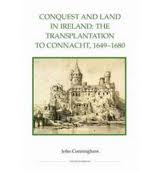Whisper it softly, but Oliver Cromwell and his role in Irish history is actually not understood very well at all in Ireland. The best summing up is in John Cunningham& #39;s book Conquest and Land in Ireland – The Transplantation to Connacht 1649-1680.
https://www.theirishstory.com/2012/03/04/book-review-conquest-and-land-in-ireland/#.X2HQcBBKjIU">https://www.theirishstory.com/2012/03/0...
https://www.theirishstory.com/2012/03/04/book-review-conquest-and-land-in-ireland/#.X2HQcBBKjIU">https://www.theirishstory.com/2012/03/0...
Cromwell came in at the tail end of a brutal war in Ireland; the Eleven Years War. He was in Ireland for less than a year, and was here essentially to defeat a coalition of Royalist & Catholic forces on behalf of English Parliament https://www.theirishstory.com/2014/01/10/the-eleven-years-war-a-brief-overview/#.X2HRChBKjIU">https://www.theirishstory.com/2014/01/1...
Cromwell campaigned ruthlessly in Ireland, massacring the garrisons of Drogheda (largely English Royalists) and Wexfod (mostly Irish Catholics) but taking the surrender of many other towns such as New Ross and Kilkenny without bloodshed.
He then left Ireland, leaving the reconquest under the command first of Henry Ireton and then, after his death at the siege of Limerick, Charles Fleetwood. So why is Cromwell such as demon figure in Irish historical memory?
Ok the first reason is that Parliamentarian forces (tho not necessarily Cromwell himself) devastated Ireland in 1650-51 in order to try to stamp out guerrilla or & #39;tory& #39; resistance. This contributed to decade long war, famine and plague to bring about a huge death toll.
This death toll is often inflated, but in 1653, a Parliamentarian Colonel, Richard Lawrence reported, “the plague and famine had swept away whole counties so that a man may ride 20 or 30 miles and not see a living creature, either man, beast or bird” https://www.theirishstory.com/2012/01/03/war-and-famine-in-ireland-1580-1700/#.X2HTTBBKjIU">https://www.theirishstory.com/2012/01/0...
In popular memory Cromwell ordered all Catholics & #39;to hell or to Connacht& #39;. But this is, actually a quite confusing amalgam of different periods. The phrase originates in the sectarian conflict between Catholic Defenders and Protestant Orangemen in rural Ulster in the 1790s
in which Catholic households would find the offending message pinned on their doors by night-time raiders.
In the 1650s, English Parliament originally envisaged removing all Irish from the provinces of Leinster & Scots from Ulster under pain of death to be replaced w. from England, America ,Bohemia(Czechs) and the Netherlands.
But they, and Cromwell in particular soon realised this was unworkable So first the plans against the Ulster Scots were quietly dropped and in 1655, John Cunningham tells us, the Act of Settlement was clarified to apply only to landowners.
Catholic landowners lost all or most of their land in some cases being compensated with poorer land in Connacht. Hence the popular memory. Henry Ireton envisaged thousands of executions of Catholics in revenge for the uprising of 1641 but in fact there were not more than 3-400
When Cromwell died and the monarchy was restored in 1660, the best connected and pro-royalist Catholic landowners recovered their land but most did not. During the Jacobite-Williamite war 1689-91, Catholics forced king James to restore all of their lands, but, they lost the war.
So basically the long lasting effect of the Cromwellian conquest was that landowning in Ireland passed to Protestant settlers, whose ancestors, or at least co-religionists, held it, and political power, until the late 19th century.

 Read on Twitter
Read on Twitter


